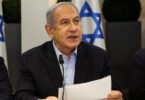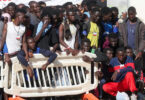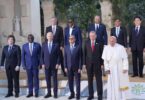Dylan Gresik
Canada published on Thursday a long-awaited report confirming that Tehran’s “decisions, actions and omissions, by civil and military officials at the highest levels,” directly led to the downing of Ukraine International Airlines Flight PS752 last year. The report states that the Islamic Republic has “fallen well short of providing a credible explanation” for the missile strikes on PS752, underscoring Iran’s continued resistance to pursuing a transparent investigation, in violation of international law.
On January 8, 2020, a missile battery belonging to Iran’s Islamic Revolutionary Guard Corps (IRGC) and positioned near Tehran’s Imam Khomeini International Airport targeted and shot down PS752 with two surface-to-air missiles. One hundred and seventy-six people, including 85 Canadian citizens and permanent residents, were killed.
Canada’s forensic team, the report said, “analyzed the information at its disposal” but affirmed that “only Iran has full access to the evidence, crash site, and witnesses.” The report lists three key findings: Iran “failed to ensure the safety of its airspace,” by keeping the airspace open and declining to notify airlines of risks; the IRGC unit that downed the plane committed a “series of extremely flawed decisions” that were avoidable; and Iran’s flawed “command and control” structure broadly “played a major role in the downing.”
Last week, Omar Alghabra, Canada’s minister of transport, publicly condemned Iran in an address to the Council of the International Civil Aviation Organization (ICAO), the UN specialized agency for aviation. Alghabra questioned the safety of Iranian airspace absent verifiable reforms and said the international civil aviation community must demand answers from Iran.
ICAO requires an investigation process following the downing of an aircraft, pursuant to Annex 13 of the Convention on International Civil Aviation. The convention requires the country of occurrence to lead the investigation, meaning Iran bore the responsibility to investigate itself in the case of PS752.
However, according to Canada’s forensic team, Iran’s final investigation report, which alleges “human error” was the primary cause of the downing and blames a handful of low-level personnel, is “evasive,” “presents a highly selective explanation of events,” and propagates “claims [that] are not substantiated with evidence.”
While the Canadian team could not conclude from available evidence that the downing was “premeditated,” the publication of its report represents the latest development in the months-long effort to secure accountability in the PS752 case.
On June 3, Canada, Sweden, Ukraine, and the United Kingdom — all countries that lost nationals on PS752 — delivered a joint “notice of claim” against the Islamic Republic. The notice demanded “a full accounting of events that led to the downing,” as well as “transparency in the criminal prosecutions” in Tehran. The Islamic Republic has yet to respond to the notice.
This process of international negotiation, arbitration, and dispute resolution is long and will require continuous multilateral pressure on Iran to achieve meaningful results.
Indeed, in the report, Canadian Prime Minister Justin Trudeau stated that if negotiations with Iran do not arrive at “an acceptable outcome,” Canada “will pursue all available options, including recourse to the International Court of Justice.”
U.S. Secretary of State Antony Blinken, UK Prime Minister Boris Johnson, and UK Foreign Secretary Dominic Raab all expressed support for Canada.
Now it is imperative that world leaders back up their firm rhetoric with strong and concrete action. Ottawa must not allow Iran to continue stonewalling and should not accept ICAO’s tepid response to Iranian violations of the UN body’s founding convention.
As the Canadian forensic report again confirms, the Islamic Republic has avoided answering critical questions related to the PS752 downing, subsequent investigation, and ongoing prosecutions. Should Iran delay in responding to the notice of claim, Canada should not hesitate to demand accountability by quickly elevating the case to the ICAO Council for review and a decision.
Follow Dylan on Twitter @DylanGresik.






